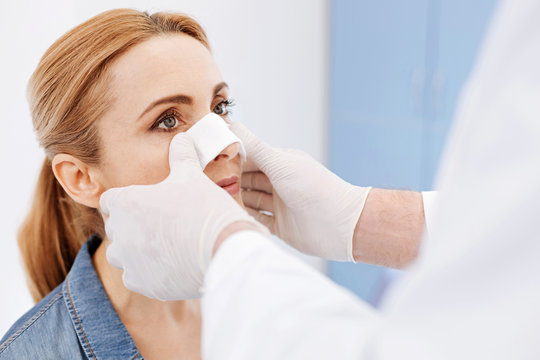Revision rhinoplasty surgery in riyadh, or secondary rhinoplasty, is a specialized surgical procedure to correct or improve the results of a previous nose surgery. It is a more complex operation than a primary rhinoplasty due to the presence of scar tissue, altered anatomy, and limited cartilage. In Riyadh, there are several surgeons and clinics with the expertise to perform these delicate and challenging procedures.

Why Patients Seek Revision Rhinoplasty
Patients may seek a revision rhinoplasty for both cosmetic and functional reasons:
- Aesthetic Dissatisfaction: Common issues include asymmetry, an over-resected (overly-reduced) nose, a "pollybeak" deformity (a beak-like appearance of the tip), or residual bumps and irregularities.
- Functional Issues: Difficulty breathing, nasal obstruction, or collapse of the nasal passages can occur if structural support was compromised during the first surgery.
Key Differences from Primary Rhinoplasty
Revision rhinoplasty is fundamentally different from a first-time nose job.
- Complexity: The procedure is significantly more challenging due to the presence of scar tissue and the potential for a lack of cartilage.
- Grafting: Surgeons often need to use cartilage grafts to rebuild or reinforce the nose's structure. This cartilage can be sourced from the patient's own body, typically from the nasal septum (if available), the ear, or the rib. In some cases, a surgeon may use a synthetic graft or fresh frozen cadaver cartilage.
- Longer Surgery and Recovery: Revision rhinoplasty typically takes longer to perform than a primary procedure, and the recovery period may be extended due to increased swelling and the complexity of the case.
- Higher Cost: Due to the added complexity, longer surgical time, and potential need for grafting materials, the cost of revision rhinoplasty is almost always higher than a primary rhinoplasty. Prices in Riyadh generally range from SAR 25,000 to SAR 40,000 or more, depending on the surgeon and the specific case.
Surgeons and Clinics for Revision Rhinoplasty in Riyadh
Given the difficulty of the procedure, choosing a highly-skilled and experienced surgeon is the most critical step. Look for surgeons who specialize in revision rhinoplasty and can show you a portfolio of their successful cases.
- Dr. Omar Fouda Neel: Dr. Fouda is a prominent figure in plastic surgery in Saudi Arabia. His clinic is known for handling complex cases, including revisions. The clinic's website explicitly mentions that the cost of revision rhinoplasty may increase depending on the patient's specific needs and whether cartilage and grafting are required.
- Enfield Royal Clinic: This clinic offers revision rhinoplasty services and is known for its experienced surgeons, including Dr. Ahmed Jarrah and Dr. Moumen Saad. They specialize in complex cases and are equipped to address issues like collapse and scar tissue formation from previous surgeries. Their prices for revision rhinoplasty typically range from SAR 25,000 to SAR 28,000.
- Dr. Jamal Jomah: With a clinic on Al Orouba Street, Dr. Jomah is a U.S. and Canadian board-certified plastic surgeon with a strong reputation in Riyadh. Surgeons with this level of international certification are often well-equipped to handle the intricacies of revision rhinoplasty.
- Sulaiman Al Habib Hospital: This hospital group is known for its high standards and state-of-the-art facilities. They employ many highly-certified plastic surgeons, including those who specialize in complex facial procedures.
What to Expect During the Consultation
A consultation for revision rhinoplasty is more in-depth than for a primary surgery. The surgeon will:
- Carefully examine the inside and outside of your nose, assessing the existing structure and the quality of the skin, bone, and cartilage.
- Discuss the problems you are experiencing and your realistic expectations for the outcome.
- Develop a surgical plan, which may include the use of cartilage grafts from your septum, ear, or rib.
- Explain the potential risks and the expected recovery timeline, which can be longer than your first surgery.




Comments